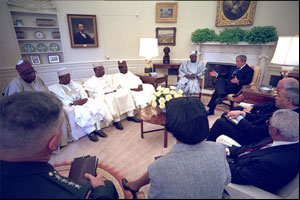|
Home >
News & Policies >
Policies in Focus
|
|
In Africa, promise and opportunity sit side by side with disease, war, and desperate poverty. This threatens both a core value of the United States— preserving human dignity—and our strategic priority—combating global terror. American interests and American principles, therefore, lead in the same direction: we will work with others for an African continent that lives in liberty, peace, and growing prosperity. Together with our European allies, we must help strengthen Africa’s fragile states, help build indigenous capability to secure porous borders, and help build up the law enforcement and intelligence infrastructure to deny havens for terrorists. An ever more lethal environment exists in Africa as local civil wars spread beyond borders to create regional war zones. Forming coalitions of the willing and cooperative security arrangements are key to confronting these emerging transnational threats. Africa: National Security Strategy Africa’s great size and diversity requires a security strategy that focuses on bilateral engagement and builds coalitions of the willing. This Administration will focus on three interlocking strategies for the region:
Ultimately the path of political and economic freedom presents the surest route to progress in sub-Saharan Africa, where most wars are conflicts over material resources and political access often tragically waged on the basis of ethnic and religious difference. The transition to the African Union with its stated commitment to good governance and a common responsibility for democratic political systems offers opportunities to strengthen democracy on the continent. The Bush Plan Transform the continent from an area characterized by:
Cultivating Africa's “Pearls”
Africa Growth and Opportunity Act HIV / AIDS |
||||||||||||||||||||||||||||||||||||||||||||||||||||||||||||
|
President
|
Vice President
|
First Lady
|
Mrs. Cheney
|
News & Policies
|
|



